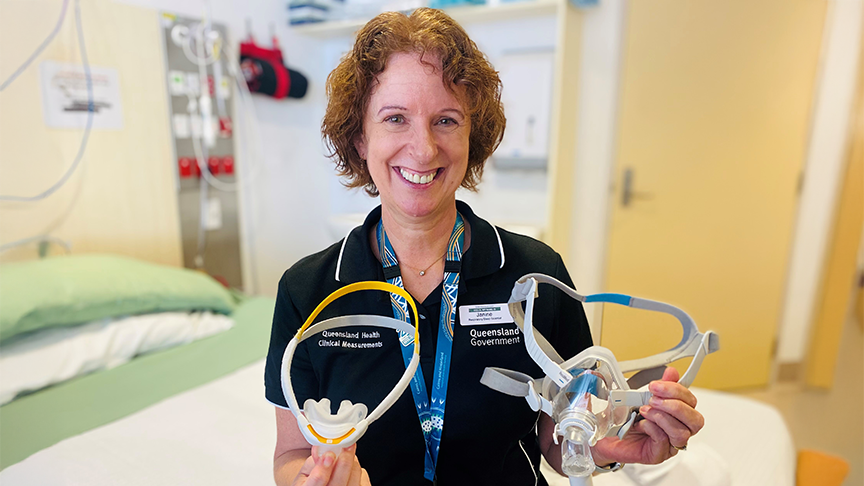 Cairns Hospital Sleep Disorders Centre Director Clinical Measurements Janine Ferns
Cairns Hospital Sleep Disorders Centre Director Clinical Measurements Janine Ferns
Cairns Hospital clinical physiologist Janine Ferns knows the importance of a good nights’ sleep.
The Director Clinical Measurements oversees the Cairns Hospital Sleep Disorders Centre, which is drastically improving the quality of life for Far North Queenslanders impacted from a lack of shut-eye.
Patients scheduled for a sleep study at the D Block lab are wired up to a sleep monitor before settling into sleep.
The sleep technologists monitor the patient's sleep phases and watch for Rapid Eye Movement (REM), leg movement, breathing rate, and oxygen and carbon dioxide levels from a diagnostic program covered in graphs that read to most like a foreign language.
In most cases the sleep study confirms obstructive sleep apnoea - blocked airways where breathing repeatedly stops and starts.
In rare cases, conditions such as REM behaviour disorder, where people act out their dreams; narcolepsy and idiopathic hypersomnolence characterised by excessive daytime sleepiness; and nocturnal epilepsy can be identified.
‘Most of our patients, probably 90 per cent of them, have got sleep apnoea,’ said Janine.
‘Patients who have been diagnosed with sleep apnoea are treated with CPAP (Continuous Positive Airway Pressure) in the lab. The CPAP device blows air through a hose and mask and keeps the airway open during sleep.
‘We also offer home sleep studies, which a lot of people like as they prefer to be in their home environment. The patient will come in, they are wired up with the home-testing monitor and they go home. We measure very similar things to the sleep lab studies. The home sleep study data is recorded and downloaded when the equipment is returned.’
The pathway to a sleep lab study is usually via a general practitioner, with excessive daytime tiredness, witnessed apnoea and drowsy driving the red flags.
Excessive weight, a large neck, age, family history, being male and lifestyle factors such as excessive alcohol are the biggest contributing factors to sleep apnoea, with 1 in 10 Australians reportedly struggling with a sleep disorder, according to the Sleep Health Foundation. Chronic lack of sleep can have more sinister implications, and can be attributed to cardiovascular disease, stroke and depression.
With a physiology degree in human biology under her belt, Janine was drawn to a career in sleep after seeing an advertisement for a respiratory sleep scientist while living in her native United Kingdom.
‘Back in the '90s there were not a lot of sleep labs. We only did two sleep studies a week and now the whole sleep world has exploded. There's a lot more awareness.’
A backpacking trip around Australia landed Janine in Cairns in 1995. She approached Cairns Hospital for work as a respiratory and sleep scientist. By 1998 Janine supported the respiratory lab opening at Cairns Hospital, followed by the sleep lab launch in 2002.
‘I've been at the hospital for 28 years now,’ said Janine.
‘When I started here in 1998 I was the only Clinical Measurement Scientist, and now I have a great team of respiratory and sleep scientists, neurophysiologists and Cardiac Scientists/Sonographers in our Clinical Measurements departments.
‘I love Cairns, love the weather and the outdoors. The people are very friendly in this part of the world. I wouldn't be anywhere else, it's a great place to live and work.’
Janine’s sleep hygiene tips:
- Establish a regular bedtime and rise time - go to bed and wake up at the same time, including on weekends
- Spend the right amount of time in bed-most adults need to 7-8 hours' sleep so 8.5hrs in bed should be adequate
- Avoid excessive exercise, alcohol, large meals or stimulating activities such as gaming before bed
- Don't clock watch - this can cause anxiety about not being able to sleep
- If you cannot fall asleep or wake up in the middle of the night and do not fall asleep within 20 minutes, don't lie in bed. Do something non-stimulating such as read a book. Journalling prior to bedtime can help with any worries if these are likely to keep you awake during the night
- Make sure the room is cool, dark and quiet
- Prioritise sleep along with a healthy diet and exercise.